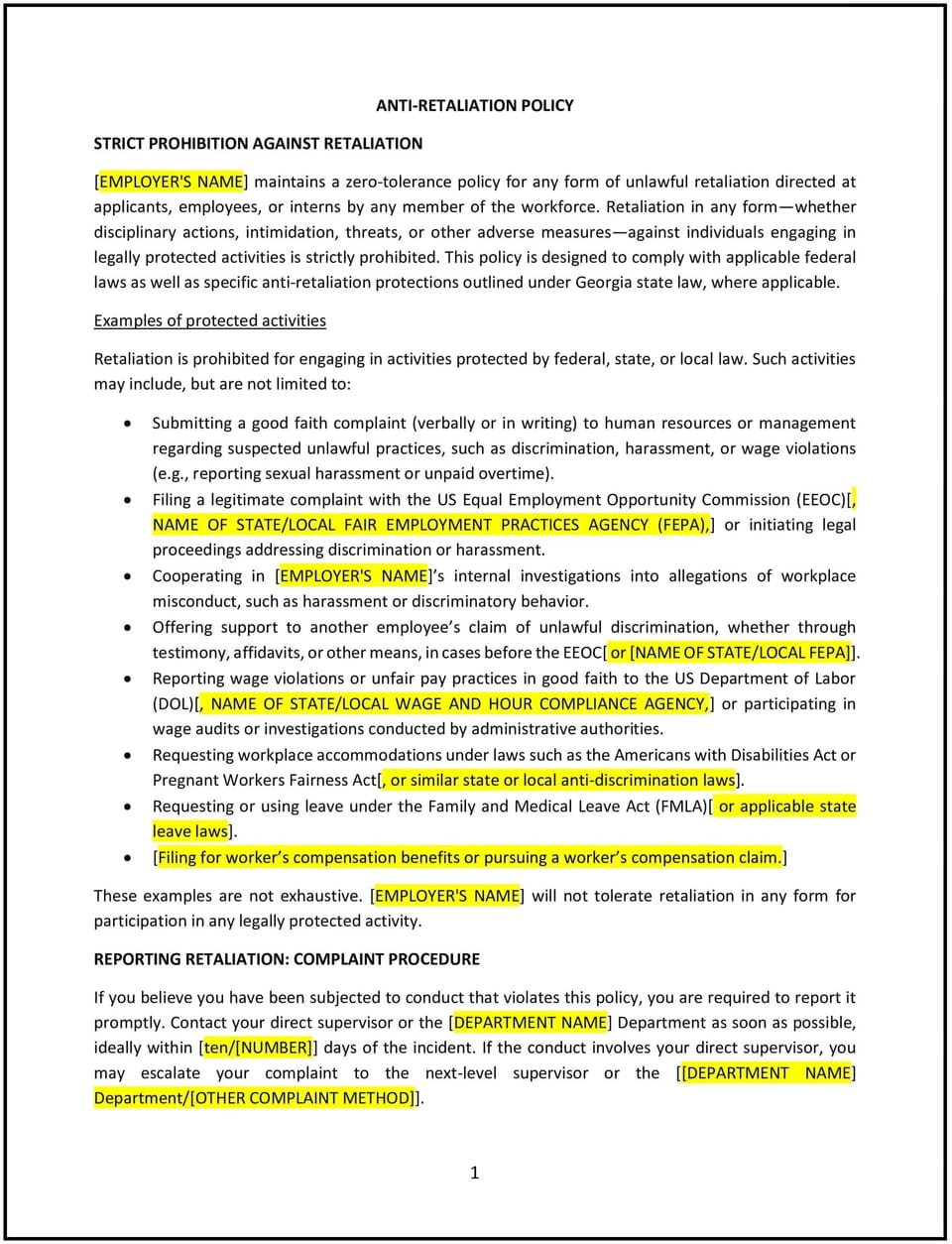Anti-retaliation policy (Georgia): Free template

Anti-retaliation policy (Georgia)
This anti-retaliation policy is designed to help Georgia businesses protect employees who report workplace misconduct or participate in investigations. The policy outlines expectations for employee protection, reporting procedures, and steps businesses should take to prevent and address retaliation in the workplace.
By implementing this policy, businesses can foster a safe, transparent, and respectful work environment where employees feel empowered to report concerns without fear of negative consequences.
How to use this anti-retaliation policy (Georgia)
- Define retaliation: Clearly state what constitutes retaliation, such as termination, demotion, harassment, or any adverse action taken against employees for reporting misconduct or participating in investigations.
- Set reporting procedures: Establish a clear process for employees to report suspected retaliation, including designated contacts (e.g., HR or a compliance officer) and options for confidential reporting.
- Emphasize confidentiality: Assure employees that retaliation complaints will be handled confidentially, and information will only be shared on a need-to-know basis during the investigation.
- Outline investigation steps: Specify the process for investigating retaliation complaints, including timelines, evidence collection, and steps to ensure a fair and unbiased review.
- Prohibit adverse actions: State that adverse actions against employees for reporting misconduct or participating in investigations are strictly prohibited and will result in disciplinary measures.
- Address consequences for retaliation: Define the disciplinary actions that will be taken against employees found to have engaged in retaliatory behavior, such as termination or other corrective measures.
- Provide support for affected employees: Offer resources, such as counseling or employee assistance programs (EAPs), to employees who experience retaliation or feel unsafe in the workplace.
- Review and reinforce the policy: Regularly review the policy to ensure it remains effective and aligned with Georgia laws, workplace dynamics, and employee needs.
Benefits of using this anti-retaliation policy (Georgia)
Implementing this policy provides several advantages for Georgia businesses:
- Fosters trust and transparency: Employees are more likely to report concerns and participate in investigations when they feel protected from retaliation.
- Promotes a safe workplace culture: A clear policy helps create a supportive work environment where employees feel respected and valued.
- Protects businesses from legal risks: Addressing retaliation proactively reduces the risk of lawsuits, regulatory complaints, and reputational damage.
- Supports accountability: Establishing consequences for retaliatory behavior ensures that employees understand the seriousness of upholding a respectful workplace.
- Reflects Georgia-specific considerations: Tailoring the policy to Georgia’s legal and cultural context helps businesses align with local standards while addressing employee concerns effectively.
Tips for using this anti-retaliation policy (Georgia)
- Communicate the policy effectively: Ensure employees understand their rights under the anti-retaliation policy and know how to report concerns. Include information in onboarding materials and regular training sessions.
- Encourage early reporting: Create an environment where employees feel safe reporting retaliation concerns promptly, enabling businesses to address issues before they escalate.
- Train management: Provide training for managers and supervisors to recognize potential retaliation and handle employee concerns appropriately.
- Monitor workplace culture: Regularly assess workplace dynamics to identify and address any behaviors that may discourage employees from reporting concerns.
- Support affected employees: Offer resources to employees who report retaliation, ensuring they feel supported and respected throughout the process.
Q: What is considered retaliation under this policy?
A: Retaliation includes any adverse action, such as demotion, termination, harassment, or unfavorable changes in work conditions, taken against an employee for reporting misconduct or participating in investigations.
Q: How can employees report retaliation?
A: Employees should report suspected retaliation to HR, their supervisor, or the designated compliance officer. Businesses should provide confidential reporting channels to ensure employees feel safe coming forward.
Q: What happens after a retaliation complaint is filed?
A: The business should initiate a prompt and impartial investigation to determine the facts. Employees will be informed of the process and any measures taken to address the issue.
Q: Are employees protected if the original complaint is found unsubstantiated?
A: Yes, employees are protected from retaliation regardless of the outcome of the original complaint, as long as the complaint was made in good faith.
Q: What are the consequences for engaging in retaliation?
A: Employees who engage in retaliatory behavior may face disciplinary actions, including termination or other corrective measures, depending on the severity of the offense.
Q: How should businesses support employees who report retaliation?
A: Businesses should provide support through resources such as counseling, EAPs, and regular check-ins with HR to ensure the employee feels safe and supported.
Q: Can retaliation occur indirectly?
A: Yes, retaliation can include indirect actions, such as spreading rumors, ostracizing employees, or making changes to work schedules to inconvenience the employee. These actions should also be addressed under the policy.
Q: How often should this policy be reviewed?
A: The policy should be reviewed annually or whenever there are changes to Georgia’s laws, workplace conditions, or employee feedback that impact anti-retaliation measures.
This article contains general legal information and does not contain legal advice. Cobrief is not a law firm or a substitute for an attorney or law firm. The law is complex and changes often. For legal advice, please ask a lawyer.


